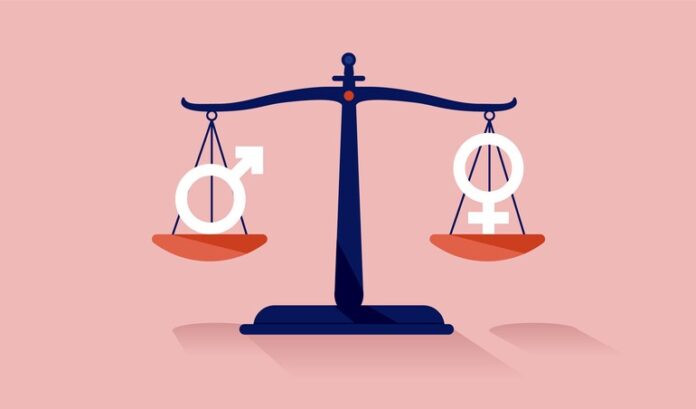PESHAWAR, Feb 16 (APP): The issue of gender disparity in government jobs continues to be a major challenge, where women face significant barriers to equal opportunities in employment, pay, and career progression.
Despite a series of reforms and policies aimed at promoting gender equality, the representation of women in the public sector departments remains strikingly low, especially in Khyber Pakhtunkhwa.
This persistent imbalance is not only a reflection of systemic inequalities but also a manifestation of broader societal issues such as illiteracy, population growth, and cultural norms that continue to restrict women’s full participation in the workforce.
Government jobs, which offer stable and prestigious career opportunities in Pakistan, span a wide range of sectors, from administration to public health, law enforcement, education, and the social sector. However, despite making up almost half of the country’s population, women account for only 5% of the federal government’s civilian workforce — a figure that falls far below international standards.
According to a report by the Pakistan Public Administration Research Centre (PPARC) from the Establishment Division, out of over 1.2 million employees in the federal government, only 49,508 are women, including those in autonomous bodies and corporations.
This figure represents a modest 6.09% increase from the previous year, indicating slow progress in narrowing the gender gap. Moreover, a 10% employment quota for women in federal government jobs, including the Civil Superior Services (CSS), has yet to yield substantial improvements.
While some provinces, notably Punjab and Sindh, have made incremental gains, the gender gap persists, particularly in Khyber Pakhtunkhwa and Balochistan, where societal and cultural barriers are deeply entrenched.
The distribution of female employees across Pakistan shows a clear regional disparity, with Punjab contributing the largest share of female government employees. These statistics highlighted the uneven progress made in different parts, where traditional gender roles, especially in regions like KP and former FATA, continue to discourage women from pursuing professional careers especially in police, forests, irrigation, mines and minerals, excise and taxation.
Professor Dr. Muhammad Naeem Khattak, a former economics department chairman at the University of Peshawar, emphasized that social, cultural, and institutional factors continue to drive gender disparity in government jobs in KP. He pointed out that in areas like KP’s former FATA, societal norms dictate that women prioritize family over professional aspirations. These expectations have not only limited educational opportunities for women but also restricted their career choices, including those that could lead to government employment.
In addition, he said the lack of market-oriented education and limited technical training for women further compounds the challenge in Khyber Pakhtunkhwa. Despite policies aimed at increasing female participation in government, such as the employment quota, women often find themselves hard to get promotions or career advancement due to red-tapism. Furthermore, unfavorable treatment at workplace, lack of mentorship and support networks discourage long-term female participation in government jobs, especially in tribal and conservative areas of KP.
“Efforts to address gender inequality in government jobs must begin with promotion of girls education especially in tribal societies of Khyber Pakhtunkhwa,” said Ikhtair Wali Khan, the PML-N spokesman while talking to APP.
He argued that the root cause of the gender gap in government employment lied in the lack of access to higher education for girls, particularly in rural and tribal areas that needed to be countered through online education.
Despite the government efforts to improve education, he claimed that millions of students in KP remain out of school, and educational institutions are often understaffed, particularly in terms of female teachers in the province.
Senior lawyer Malik Ashfaq Khan stressed that the 1973 constitution guaranteed the right of every citizen to pursue any profession, including those traditionally dominated by men, such as defense, law enforcement, police and politics.
He said reserved seats for women in national and provincial assemblies are a step toward ensuring female representation, but more needs to be done to ensure equal opportunities for women in government jobs.
Dr. Riffat Sardar, Chairperson of the Khyber Pakhtunkwha Commission on the Status of Women, acknowledged the pace of progress to remove general disparity in government jobs in the country, highlighting ongoing efforts to improve women’s participation in both the public and private sectors as government reforms has brought fruits.
She referred to various policies introduced by the government to address gender inequality, including the National Gender Policy (2002) and Women’s Empowerment Package (2017), increase women quota in Federal government jobs including CSS and Parliament besides increasing BISP stipend to Rs13500 this year to facilitate nearly one million BISP beneficiaries to educate their loved ones.
She said these initiatives aim to increase female representation in government jobs through quotas and leadership development programs besides ensuring gradual increase in female participation in the judiciary, police, and other administrative roles. She underlined the need for promotion of online education to encourage girls to pursue higher studies imperative to create jobs for the educated women.
Khaliqur Rehman, KP Minister noted that the government is actively encouraging women to compete with men through various competitive exams like KPPSC and ETEA. He said family-friendly policies such as flexible working hours, paid parental leave, and child care facilities are ensured to facilitate working women in KP.
Despite significant progress, the experts said a multifaceted approach was required to achieve gender equality in government employment after tackling systemic barriers, changing societal attitudes toward women’s work, and implementing policies that ensure women not only have equal access to government jobs but also opportunities to thrive in leadership positions.
APP/fam/taj (APP Feature Service)

